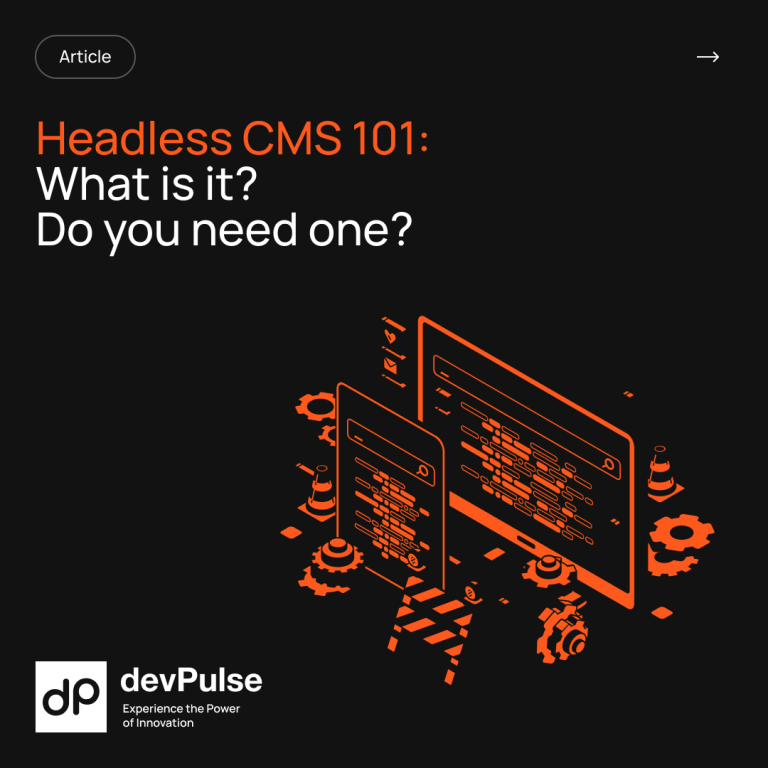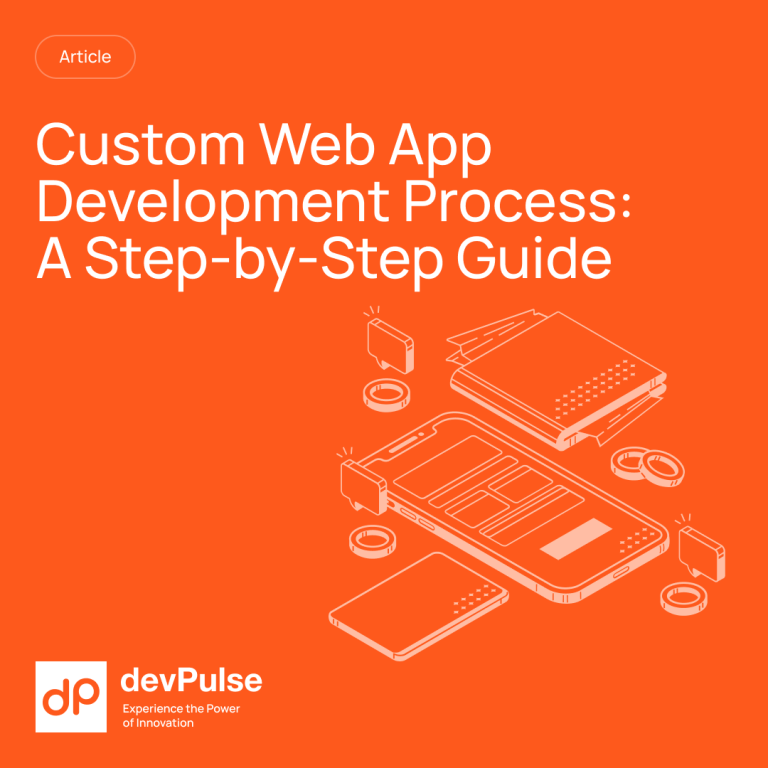You can only choose the right web development partner by making informed decisions considering their expertise, portfolio, work ethic, and philosophy.
But how do you assess these things if you’re just dipping your toes into this area? Worry not!
Today, I want to share with you some of the core values that we prioritize as a web development company and, thus, the values that you should also be paying attention to.
For each respective category, I have also provided a series of questions you can ask your potential web development partner to understand their competencies and experience better.
Let’s dig in!
Experience and expertise of the developers: look for a partner with a proven track record
Look for a web development partner with a proven track record of delivering projects, preferably in your industry or a niche.
Why? Well, because there’s a theory, there’s practice, and then there’s wisdom. An experienced web development company will have all 3, thus possessing the intuition and skillset necessary to understand your specific requirements and be capable of providing a bespoke solution.
In the same scenario, a less experienced developer will try to do the opposite – fit your needs into a boilerplate they will be comfortable with.
Here are core expertise factors I’d suggest you evaluate:
Industry expertise
This is the aforementioned wisdom. Even if all web dev projects have a similar foundation, they will differ in things you need to emphasize, things you should not pay too much attention to, etc.
While there’s undoubtedly some theory and guesswork you can lean on (i.e., a fashion brand would want a flashier design that speaks to the brand’s identity), most decisions are best understood through practical experience.
Technical expertise
The purpose of code is not to coexist for its own sake but to deliver a solution to a pain point in your business.
As such, there’s no such thing as loyalty to one specific language or a framework. An experienced developer understands that there’s always a suitable tool for the job and chooses the appropriate one, be it some of the latest web technologies or tried and true classics.
So it’s neither hype chasing after the trends nor being an old dog unable to learn any new tricks – it’s a careful balancing act between the two.
Diversity/Vertical integration
The golden engineering rule says that the more moving parts = the more points of failure.
There are as many types of web dev partners as there are ice-cream flavors: you have your hardcore coding-only teams, small collectives with jacks of all trades, and then there are well-rounded organizations that have dedicated designers, coders, product owners, and more.
Ideally, you’d want to find someone like that. Because, sure, you can hire designers in one place, devs in the other, but controlling the process becomes so, so much more complicated.
You will either have to act as a ferryman between two teams and coordinate the process or hope they can work together without a hitch.
Portfolio and testimonials
But, remember: any company’s ultimate goal is to get your business. So, even a company with an objectively good product or a service will engage with marketing and try to showcase itself in the best possible light. Otherwise, Apple’s marketing budget wouldn’t be as large as it is 😅
But while words can deceive and obfuscate, results cannot.
So, check out the company’s portfolio. Ask them to show an example of a complex project they have released (because not everything can be shown publicly)
If you can, seek out unfiltered opinions from these companies that the web developers have partnered with. Trust me: if they have been left unsatisfied, they won’t be mincing words.
Here are some questions you can use as a guideline to learn more about your would-be partner:
- What experience do you have in our industry or niche?
- Can you provide examples of projects similar to ours that you have worked on?
- What is the range of technical expertise within your team?
- How do you stay up-to-date with the latest web development technologies and trends?
And speaking of portfolio and case study, I think we should take a closer look at that factor, as I feel there are plenty of nuances worth addressing in more detail.
Portfolio and case studies: assess the quality and diversity of their work.
So, companies try to showcase their talent in two main ways: portfolio (i.e., body of work) and case studies, which are more in-depth looks at the problems the company has tried to solve.
First, let’s look at how to assess the portfolio side of things.
Portfolio assessment criteria
- Quality of design. Do the websites they’ve worked on have visually appealing and user-friendly designs?
- Functionality. Go to the website showcased and check how it performs. Does it load quickly, do you have any issues with navigation, does the design adapt to the mobile and tablet formats?
- Range of projects. I think this point is a bit contentious, but I personally believe that developers are better off having a diverse portfolio rather than a narrow and specialized one. Working on different projects requires thinking and prioritizing differently, making you a more well-rounded developer.
Case study assessment criteria
Moving onto the case studies, these typically outline the client’s challenges, the solutions provided, and the achieved outcomes.
When looking at these, take a closer look at the following:
- Find a case study similar to your case. No problem is created equal, but if you find a case from your niche or an issue you’re facing, you may ask how the company will approach your project.
- Problem-solving skills: look at the problems the company identified and their rationale for solving them. Does it make sense to you? Or does it feel like it’s been written by someone who has no idea what they’re talking about? That’s why it’s so crucial to find a case study from your domain of expertise; it will give you an easier time cutting through B.S.
- Results and impact: does case study provide quantifiable, meaningful outcomes or is it just some fluff like “it was bad, but now it’s good?” Of course, it’s not always possible to provide concrete numbers, but you should finish reading it with an understanding of how the partnership made the client’s life better.
And if you want to get even more insights, feel free to ask these questions:
- Can you walk us through some of the notable projects in your portfolio?
- How do you approach problem-solving when faced with unique challenges in a project?
- Do you have case studies that demonstrate the impact of your work on a client’s business?
- How do you ensure that your solutions are scalable and adaptable to changing business needs?
Web application security: data protection a top priority
So, when talking about enterprise level, web application security is undoubtedly one of the main priorities.
It’s not only that the projects themselves become more complicated, but it also necessitates paying more attention to all the moving parts. However, being a large enterprise paints a considerable target on your back.
Let’s say you’re handling sensitive customer information, such as personal details and financial data. If your website’s security biomes are compromised, hackers can access your client’s database, leading to fraud, loss of customer trust, and potential lawsuits.
Thus, security is paramount, and a web development partner should take it seriously.
You don’t need to leave it all to trust, either. Here’s an example of questions you can ask developers to assess their expertise:
- What security measures do you implement during the development process?
- How do you handle user authentication and authorization?
- What measures do you take to protect against common web vulnerabilities, such as SQL injection and cross-site scripting (XSS)?
- Do you have experience with encryption and secure data transmission protocols?
- How do you ensure the security of third-party integrations and APIs?
- What is your process for handling security updates and patches post-launch?
While you certainly can ask these questions during a call, I think some kind of text-communication channel, like e-mail, would serve you better here.
I think that answers to some of these questions can be pretty in-depth, and much nuance can be lost during a conversation. Plus, receiving answers in the text can help you quickly get a third-party perspective if you’re not confident in your ability to properly assess their replies’ validity.
Cost and value: between budget and ROI
As with anything, we want to maximize value from our commitment of both time and money. But to gain the best ROI, you need to strike a balance! It is not the cheapest, nor is it the most expensive option. What you’re looking for are cost-effective web solutions.
Let me explain. Say you opt for a cheaper option to save money upfront. Yet, developers fail to meet deadlines to deliver the desired functionality, and in the worst case, they leave your project with glaring vulnerability issues.
So, you will be left out with a project that doesn’t satisfy your business needs, or you will have to pay again so that someone will try and salvage it.
However, consider an opposite situation: going for a premium option just because. While getting a premium option may guarantee quality, it doesn’t guarantee positive ROI. In other words, you may pay more money than you will get from your project.
Factors to consider
When evaluating the cost of a web development partner, consider the following factors that contribute to long-term ROI:
- Scalability: A solution that can grow and adapt to your changing business needs, saving you from costly redevelopment in the future.
- Performance: A well-optimized website that loads quickly and performs smoothly, leading to better user engagement and conversion rates.
- User experience: A user-friendly interface that encourages visitors to stay on your site longer and interact with your content, increasing the likelihood of conversions.
- Maintenance and support: Ongoing technical support and timely updates to keep your website secure, stable, and up-to-date with the latest web standards.
Ideally, assessing budget and ROI is something you will do in tandem with your web development partner of choice. Opt for a company with both breadth and depth of experience. They will be able to answer your questions of time and money in quantifiable, discrete terms (potentially, with examples).
And what are these questions?
- Can you provide a detailed breakdown of your pricing structure?
- Are there any hidden costs or additional fees we should be aware of?
- How do you ensure that your pricing remains competitive without compromising on quality?
- Can you provide examples of how your solutions have delivered long-term ROI for your clients?
- What ongoing support and maintenance services do you offer, and at what cost?
- How do you handle scope changes or additional feature requests during the project?
Development philosophy, methodology, and communication
By now, you have indeed discerned that choosing the right team to work with remains one of the most difficult challenges in web development. And that’s even before we discussed something so complicatedly human: development methodology and communication.
Ultimately, it’s not like you’re working with a microwave where you just need to input all parameters correctly, and a website will pop up. You will have to work with other humans, and if you are not connecting with them about how they do business, the friction won’t do your project any favors. Because it’s a partnership, first and foremost, and that implies cooperation.
If you’re being constantly left in the dark about the project’s status, you cannot make informed decisions and steer the project in something that helps you!
To avoid such scenarios, choosing a partner that uses a robust and proven development methodology, has a clear project management approach, and values open communication is essential.
Factors to consider
When evaluating these traits in your potential partnership, you need to pay attention to the following:
- Clarity and conciseness in their responses to your questions
- Ability to explain technical concepts in a way that non-technical stakeholders can understand
- Willingness to listen to your ideas, concerns, and feedback
- Proactiveness in identifying and addressing potential roadblocks or challenges
- Ability to maintain open lines of communication and provide regular progress updates
Here are the questions you can ask them to help you evaluate those traits:
- How do you approach project planning and defining project milestones?
- What project management tools do you use to track progress and deliverables?
- How often will we receive updates on the project’s status?
- What communication channels do you use (e.g., email, phone, video calls, project management software)?
- How do you handle feedback and incorporate changes throughout the development process?
- What is your process for testing and quality assurance at each stage of development?
- How do you ensure a smooth handover and knowledge transfer upon project completion?
Can devPulse be your web development partner of choice?
Well, let me tell you something about devPulse, first.
Years on the market
We have been working under the devPulse banner since 2014, although our core team formed even earlier than that, in 2009.
Technological stack
Before web development, we’ve worked on enterprise-tier desktop solutions, so we have experience with a wide range of technologies:
- Mobile development (ObjC, SwiftUI)
- Web development (MERN, PHP, WP, Python, C#, .Net)
- Desktop development: C++
- Hybrid solutions: React Native, PWA, Electron
Ability to adapt and understand your needs
We don’t use boilerplates or cookie-cutter solutions and can think on the fly to satisfy the needs of our partners.
Once, a client relied on a third-party dependency that was about to be depreciated – a considerable threat to the product’s longevity. They’ve turned to us, and after our thorough analysis and audit, we’ve devised a way to transfer their product to a more stable stack of technologies while making meaningful upgrades to expand their market presence.
This little detour into our story answers the question above, but the truth is…I don’t know.
I like to be honest with the people we work with, and I will need to talk with you to understand if we can deliver what you need. I will even argue that there are specific scenarios in which you don’t need custom web development whatsoever. In such a case, we’ll gladly help you find the out-of-the-box solution that will fit your needs.
Because, at the end of the day, this is a partnership. We don’t want to give our partners any headache, nor do we want to spend time on a project that we cannot or have no desire to support.
But if you’re ready to find that out, let’s talk! And see if we can make something great together.
FAQ
What if I have a limited budget for my web development project?
When working with a limited budget, it’s essential to find a web development partner who can provide cost-effective solutions without compromising quality. Look for a company that offers transparent pricing, is willing to work within your budget constraints, and can suggest ways to optimize your project to get the most value for your money.
How long does it typically take to develop a web application for an enterprise?
The timeline for developing a web application varies depending on the project’s size, complexity, and specific requirements. On average, a small to medium-sized enterprise web application can take anywhere from 3 to 6 months to develop, while larger, more complex projects may take 6 to 12 months or more. Your web development partner should provide you with a clear timeline and milestones based on your project’s scope.
What happens after the web application is launched?
After your web application is launched, your web development partner should provide ongoing support and maintenance. It may may include bug fixes, security updates, performance optimizations, and new feature development. It’s crucial to discuss post-launch support and maintenance plans with your partner beforehand to ensure you’re on the same page.



